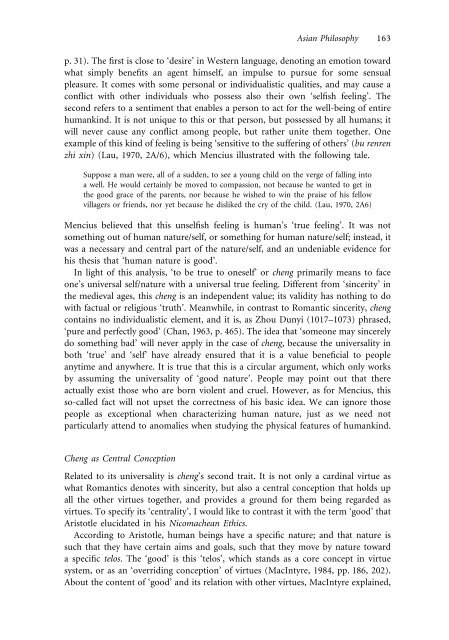Western sincerity and Confucian Cheng
You also want an ePaper? Increase the reach of your titles
YUMPU automatically turns print PDFs into web optimized ePapers that Google loves.
Asian Philosophy 163<br />
p. 31). The first is close to ‘desire’ in <strong>Western</strong> language, denoting an emotion toward<br />
what simply benefits an agent himself, an impulse to pursue for some sensual<br />
pleasure. It comes with some personal or individualistic qualities, <strong>and</strong> may cause a<br />
conflict with other individuals who possess also their own ‘selfish feeling’. The<br />
second refers to a sentiment that enables a person to act for the well-being of entire<br />
humankind. It is not unique to this or that person, but possessed by all humans; it<br />
will never cause any conflict among people, but rather unite them together. One<br />
example of this kind of feeling is being ‘sensitive to the suffering of others’ (bu renren<br />
zhi xin) (Lau, 1970, 2A/6), which Mencius illustrated with the following tale.<br />
Suppose a man were, all of a sudden, to see a young child on the verge of falling into<br />
a well. He would certainly be moved to compassion, not because he wanted to get in<br />
the good grace of the parents, nor because he wished to win the praise of his fellow<br />
villagers or friends, nor yet because he disliked the cry of the child. (Lau, 1970, 2A6)<br />
Mencius believed that this unselfish feeling is human’s ‘true feeling’. It was not<br />
something out of human nature/self, or something for human nature/self; instead, it<br />
was a necessary <strong>and</strong> central part of the nature/self, <strong>and</strong> an undeniable evidence for<br />
his thesis that ‘human nature is good’.<br />
In light of this analysis, ‘to be true to oneself’ or cheng primarily means to face<br />
one’s universal self/nature with a universal true feeling. Different from ‘<strong>sincerity</strong>’ in<br />
the medieval ages, this cheng is an independent value; its validity has nothing to do<br />
with factual or religious ‘truth’. Meanwhile, in contrast to Romantic <strong>sincerity</strong>, cheng<br />
contains no individualistic element, <strong>and</strong> it is, as Zhou Dunyi (1017–1073) phrased,<br />
‘pure <strong>and</strong> perfectly good’ (Chan, 1963, p. 465). The idea that ‘someone may sincerely<br />
do something bad’ will never apply in the case of cheng, because the universality in<br />
both ‘true’ <strong>and</strong> ‘self’ have already ensured that it is a value beneficial to people<br />
anytime <strong>and</strong> anywhere. It is true that this is a circular argument, which only works<br />
by assuming the universality of ‘good nature’. People may point out that there<br />
actually exist those who are born violent <strong>and</strong> cruel. However, as for Mencius, this<br />
so-called fact will not upset the correctness of his basic idea. We can ignore those<br />
people as exceptional when characterizing human nature, just as we need not<br />
particularly attend to anomalies when studying the physical features of humankind.<br />
<strong>Cheng</strong> as Central Conception<br />
Related to its universality is cheng’s second trait. It is not only a cardinal virtue as<br />
what Romantics denotes with <strong>sincerity</strong>, but also a central conception that holds up<br />
all the other virtues together, <strong>and</strong> provides a ground for them being regarded as<br />
virtues. To specify its ‘centrality’, I would like to contrast it with the term ‘good’ that<br />
Aristotle elucidated in his Nicomachean Ethics.<br />
According to Aristotle, human beings have a specific nature; <strong>and</strong> that nature is<br />
such that they have certain aims <strong>and</strong> goals, such that they move by nature toward<br />
a specific telos. The ‘good’ is this ‘telos’, which st<strong>and</strong>s as a core concept in virtue<br />
system, or as an ‘overriding conception’ of virtues (MacIntyre, 1984, pp. 186, 202).<br />
About the content of ‘good’ <strong>and</strong> its relation with other virtues, MacIntyre explained,


